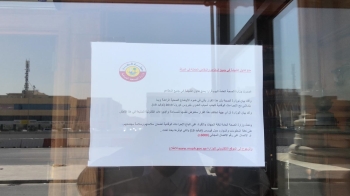Introduction
 The State of Qatar set up the Supreme Committee for Crisis Management to respond to the COVID-19 pandemic and the Ministry of Public Health is ramping up health awareness activities during this critical period. Qatar’s Ministry of Public Health is focusing on three main areas within tobacco control: enforcing a ban on waterpipe use in public places, a national awareness campaign and smoking cessation services.
The State of Qatar set up the Supreme Committee for Crisis Management to respond to the COVID-19 pandemic and the Ministry of Public Health is ramping up health awareness activities during this critical period. Qatar’s Ministry of Public Health is focusing on three main areas within tobacco control: enforcing a ban on waterpipe use in public places, a national awareness campaign and smoking cessation services.
Ban on waterpipes in public places
Qatar’s Ministry of Public Health, on 10 March 2020, issued a decision banning waterpipes in all restaurants and cafés. The Ministry clarified that the decision came in light of current health conditions as well as in line with precautionary measures to prevent the spread of COVID-19. The decision was published in the official newspaper and disseminated widely across social media platforms. Health inspectors were sent out to enforce the ban and immediately all restaurants and cafés responded by removing waterpipes. Health inspectors are regularly monitoring the implementation of the decision. To date, the implementation rate is 100% with no reports of violations. Some restaurants and cafés have displayed stickers indicating the ban on waterpipes.
The ban on waterpipes in all restaurants and cafés will remain in effect until further notice. Dr Kholood Al Mutawa, Head of Non-Communicable Diseases Section at the Public Health Department, stated: “We expect that the ban will continue till further notice by the Supreme Committee for Crisis Management and the Ministry of Public Health, things will not go back to be the same”. As a result of the ban, waterpipe tobacco mix (Mu’assal) imports have dropped by 40%.
Following the ban, the Ministry of Public Health has worked closely with the Ministry of Commerce and Industry to facilitate the issuance of all licenses for restaurants and cafés except those for waterpipe use. This further ensured the smooth implementation of the banning decision.
Awareness campaign during COVID-19
Qatar’s Ministry of Public Health launched a COVID-19 awareness page on its website, covering all data and updates related to the pandemic. The Ministry is working closely with the Hamad Medical Corporation to run country-wide awareness campaigns. They are coordinating closely to ensure alignment of messages. The messages focus on COVID-19 prevention, protection and risk factors – smoking is highlighted as one of the key risk factors. The awareness campaign uses social media (Facebook, Instagram, Twitter and YouTube) alongside newspapers. The messages are also disseminated through EHTERAZ, a mobile application, developed by the Ministry of Interior which is working closely with the Ministry of Public Health on public health awareness.
Adapting smoking cessation services
The Hamad Medical Corporation Tobacco Control Centre – WHO Collaborating Centre – has shifted its smoking cessation services to phone consultations to enable continuing its operation in light of the current lockdown and restrictions. The consultation includes an extensive assessment to generate a personalized quitting plan, psychological support and a follow-up appointment. In addition, a 24/7 smoking cessation hotline was established by the Centre. The hotline serves as a counselling hub where inquiries are addressed by a smoking cessation specialist at all times. In addition, prescribed medications are home delivered within 24 hours across the State of Qatar without having to attend the healthcare facilities.
These services have proven their success as the Centre witnessed a noticeable increase in their uptake. Accordingly, the Centre tripled the number of functional clinics throughout the week. All patients using the services have expressed their satisfaction with the efficiency of phone consultations and the short time needed to secure an appointment at the Centre. Consequently, this has impacted positively on engagement and response rates.
To further support and promote smoking cessation, a number of WhatsApp groups were created to disseminate health messages and tips amongst patients. These messages and tips were also posted on all the Centre’s social media platforms. In conjunction with these efforts, a number of TV channels have hosted the Centre’s specialists through phone interviews to spread awareness about the link between tobacco use and the transmission of the virus that causes COVID-19. The Centre has also received wide media coverage highlighting its role during this period.
Way forward
The Supreme Committee for Crisis Management has developed a country-wide transition plan to start lifting COVID-19 restrictions and eventually returning to normal activities, subject to the COVID-19 developments across the country. The plan, which started its first phase on 15 June 2020, consists of four phases. The first phase covered two weeks and the remaining three phases to cover one month each, with the last phase starting 1 September 2020.
In the second phase of the plan, shopping malls and markets are planned to open with limited capacity. Within the plan, there is a ban on smoking in front of mall entrances and main gates in addition to removal of all smoking-related aides such as ashtray bins. Malls will be required to place “No smoking” signs outside their main entrances.
The Hamad Medical Corporation Tobacco Control Centre is working on extending the current smoking cessation hotline into a national toll-free quit line.
Related links
Hamad Medical Corporation post on what happens to your body when you quit smoking (Instagram)
Qatar’s Ministry of Public Health bans shisha/hookah in all restaurants and cafés
Qatar’s Ministry of Public Health website coronavirus (COVID-19) page


